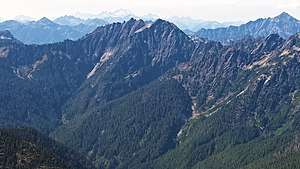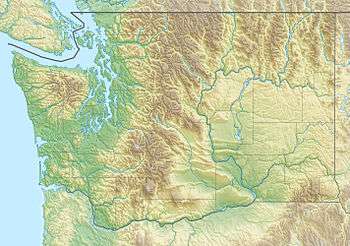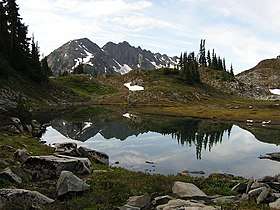Mount Duckabush
Mount Duckabush is a 6,254-foot (1,906 m) peak located in Olympic National Park in the Olympic Mountains of Washington state.[1] The headwaters of the Duckabush River include the northwest slopes of Mount Duckabush.
| Mount Duckabush | |
|---|---|
 Mount Duckabush seen from Mount Skokomish | |
| Highest point | |
| Elevation | 6,254 ft (1,906 m) NAVD 88[1] |
| Prominence | 1,250 ft (380 m) [1] |
| Coordinates | 47°37′50″N 123°21′42″W [1] |
| Geography | |
 Mount Duckabush  Mount Duckabush Mount Duckabush (the United States) | |
| Parent range | Olympic Mountains |
| Topo map | USGS Mount Duckabush |
Climate
Based on the Köppen climate classification, Mount Duckabush is located in the marine west coast climate zone of western North America.[2] Most weather fronts originate in the Pacific Ocean, and travel northeast toward the Olympic Mountains. As fronts approach, they are forced upward by the peaks of the Olympic Range, causing them to drop their moisture in the form of rain or snowfall (Orographic lift). As a result, the Olympics experience high precipitation, especially during the winter months. During winter months, weather is usually cloudy, but, due to high pressure systems over the Pacific Ocean that intensify during summer months, there is often little or no cloud cover during the summer.

References
- "Mount Duckabush, Washington". Peakbagger.com.
- Peel, M. C.; Finlayson, B. L. & McMahon, T. A. (2007). "Updated world map of the Köppen−Geiger climate classification". Hydrol. Earth Syst. Sci. 11. ISSN 1027-5606.
External links
- "Mount Duckabush". Geographic Names Information System. United States Geological Survey.
- "Mount Duckabush". SummitPost.org.